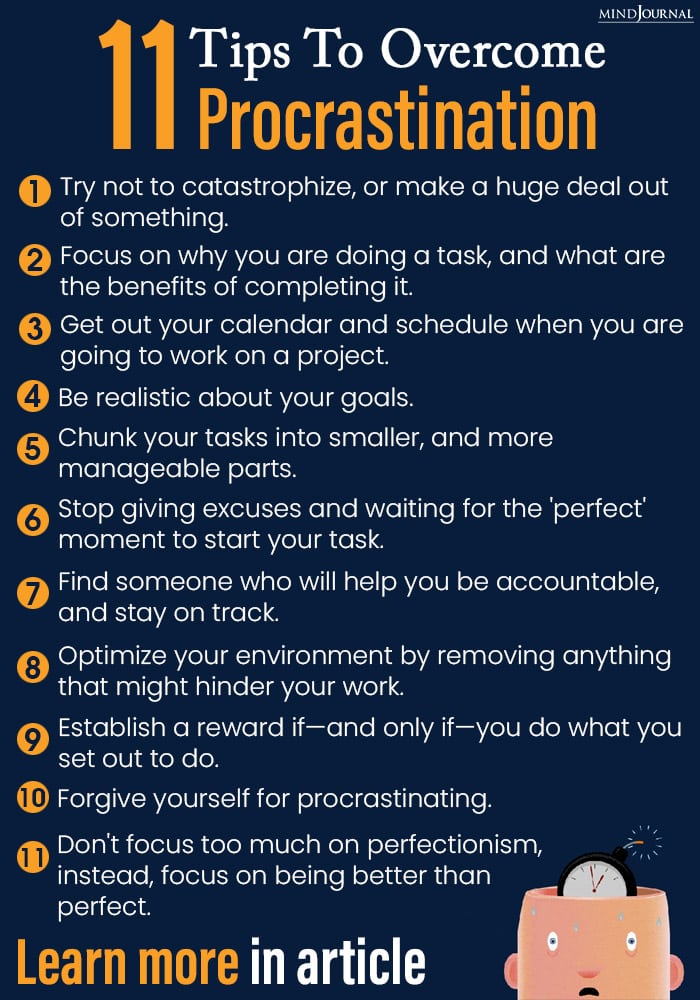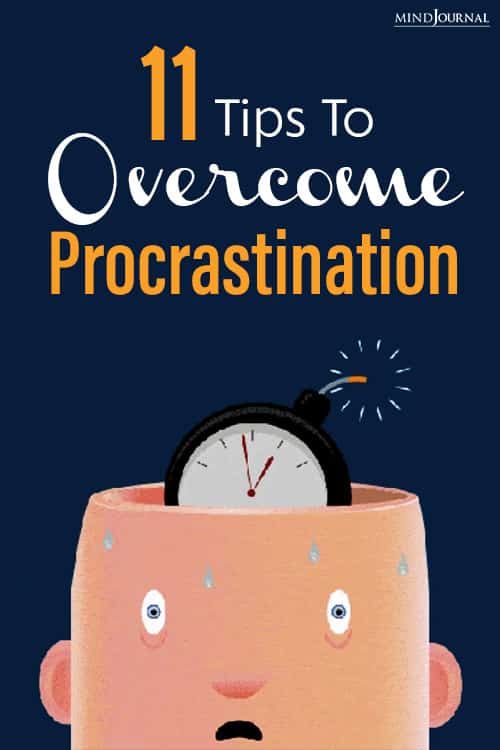“Lack of confidence, sometimes alternating with unrealistic dreams of heroic success, often leads to procrastination, and many studies suggest that procrastinators are self-handicappers: rather than risk failure, they prefer to create conditions that make success impossible, a reflex that of course creates a vicious cycle.” ― James Surowiecki
KEY POINTS
- Procrastination is not a time management problem; rather, it’s likely due to difficulty managing negative feelings like boredom or anxiety.
- But avoiding negative emotions—and important tasks—tends to lead to much worse outcomes in the long run, including more stress and regret.
- Changing your mindset, rewarding yourself for progress, and letting go of perfectionism can all help you overcome procrastinating tendencies.
Everyone has put off a task at some point in their life. (Take, for example, this article that I had planned on posting yesterday…) But have you ever wondered why you—or others—procrastinate? While some view it (in themselves or other people) as laziness, there might be something else at play.
In psychology, it has long been believed that people who procrastinate have a faulty sense of time—that they think they will have more time to get something done than they actually do. While that may be true for some, more recent research suggests procrastination is linked to difficulty managing distress. Specifically, it seems that task aversion is to blame—that is, when people view a task in an unpleasant manner (“It will be tough, boring, painful…”), they are more likely to put it off.
While procrastinators may be trying to avoid distress, this approach can ironically cause more distress in the long run.
Procrastination can lead to increased stress, health problems, and poorer performance. Procrastinators tend to have more sleep issues and experience greater stressful regret than non-procrastinators. What’s more, procrastination can also hinder your self-esteem with the guilt, shame, or self-critical thoughts that can result from putting off tasks.
Related: 7 Negative Mindsets That Undercut Your Mental Strength and Resilience
If you struggle with putting things off, try any of these tips to get you on track:

1. Get Rid Of Catastrophizing.
One of the biggest reasons people procrastinate is because they catastrophize, or make a huge deal out of something. It may be related to how tough, how boring, or how painful it will be to complete the task; whatever the case, the underlying theme is that doing the task will be “unbearable.”
In reality, challenges, boredom, and hard work will not kill you—or even make you sick. Procrastination, on the other hand, is associated with stress—think of the stress you feel when you avoid making a phone call you know you need to make. So keep things in perspective: “Sure, this is not my favorite task, but I can get through it.”
2. Focus On Your “Why.”
Procrastinators focus more on short-term gains (avoiding the distress associated with the task), as opposed to long-term results (the stress of not doing it, as well as the consequences of avoiding this task). Instead, try focusing on why you are doing this task: What are the benefits of completing it?
If you’ve been putting off cleaning out a closet, imagine walking into the closet when it is decluttered and how good that will feel. And consider how much money you will make by selling the items on eBay, or how those in need will feel when they receive these items as donations.
If it is an exercise program you have been avoiding, focus on how exercising will help you have more positive energy, give you a boost of self-esteem, and serve as a great role model for your children.
3. Get Out Your Calendar.
Projects that will get done “when I have time” (as in “I will do it when I have time”) tend not to get done very often, if ever. You need to schedule when you are going to work on a project and block out that time, just as you would an important meeting.
And when it is time to do your work, set a timer so you can be focused for the entire allotted time.
Related: Why We Procrastinate and 6 Things We Can Do About It
4. Be Realistic.
As you establish your schedule, set yourself up for success. Projects often take much longer than expected, so bake in some extra time. And look for ways to make it easier on yourself: If, for example, you are not a morning person, don’t expect yourself to get up an hour early to start the exercise program you have put off for months. It might be better to schedule that activity during lunch or before dinner.
5. Chunk It.
When a task seems overbearing, procrastination often follows. So how can you break that task into smaller, more manageable parts? For example, if you want to write a book, you may choose to make an outline, identify each chapter, figure out the sections in the chapters, and then commit to writing one segment at a time. Chunking it down like this will help you feel less overwhelmed and more empowered.
Related: Understanding Why You Procrastinate (and How To Stop)
6. Excuses Be Gone.
Do any of these sound familiar? “I need to be in the mood.” “I will wait until I have time.” “I work better under pressure.” “I need X to happen before I can start.”
Stop it!
Be honest with yourself: These are excuses. Sure, it might be nice to ”be in the mood,” but waiting for that to happen can mean you never start your project.

7. Get A Partner.
Establish specific deadlines for completing a task. Then find someone who will help you be accountable. It could be a promise to your boss or client that you will complete the job by a certain date. Or it may be a coach who helps you stay on track. Or simply find an accountability partner.
In this relationship, you connect with someone (on the phone, for example) at certain time intervals (such as once per week) and commit to what you will do before your next meeting. Not wanting to go back on your word, can be a great way to squash procrastination. (Note: In an effort to save your relationship with your significant other, I recommend this person not be your partner. You don’t want a lack of follow-through to cause tension between you.)
8. Optimize Your Environment.
Your environment can help or hinder your productivity. Beware especially of technology, such as your email or messenger that keeps pinging to let you know someone has reached out. Social media, internet “research” that leads you far off track, and phone calls can lead to procrastination.
So try this: During your scheduled block of time for working on a particular task, close your email and IM, turn off your phone (or at least set it on “Do Not Disturb” and put it out of sight), and don’t let yourself get on the web until you have completed the task, or hold off any necessary internet searches until the end.
Related: 5 Things To Do When You Procrastinate Almost Everything In Your Life
9. Reward Good Behavior.
Establish a reward if—and only if—you do what you set out to do. Do not let yourself binge that new Netflix show, check your social media, or get lunch until you complete what you’ve scheduled. So instead of using these tasks and distractions to procrastinate, make them contingent on you actually finishing what you schedule yourself to do.
10. Forgive Yourself.
Stop beating yourself up about the past. Thoughts such as “I should have started earlier” or “I always procrastinate; I am such a loser” will only make matters worse. Research shows that forgiving yourself for past procrastination will help you stop putting off working on a task.
You can try to use past procrastination to your advantage as well. How? Determine what went into your avoidance—fear, stress, not having a good understanding of how to progress, lack of accountability, etc. Then address those obstacles in the present and future. If, for example, it was fear that contributed to your procrastination, what steps can you take to feel more empowered and less fearful next time around?
11. Drop The Perfectionism.
Perfectionism is an all-or-nothing mentality: Something is either perfect, or it is a failure. People with perfectionistic tendencies tend to wait until things are perfect in order to proceed—so, if it’s not perfect, you cannot be finished. Or if it is not the perfect time, you believe you can’t start. This all-or-nothing mentality can hold you back from starting or completing tasks.
Instead, focus on being better than perfect. This means to still strive for excellence, creating excellence, or setting yourself up with excellent conditions, but at the same time, you focus on getting the job done. Done is better than perfect.
Make “some day” today. Follow these steps to get started on your project, and be proud of every bit of progress you make.
For daily inspiration follow Dr. E on Instagram: DrELombardo https://www.instagram.com/drelombardo/
Written By Elizabeth Lombardo Originally Appeared In Elizabeth Lombardo











Leave a Reply